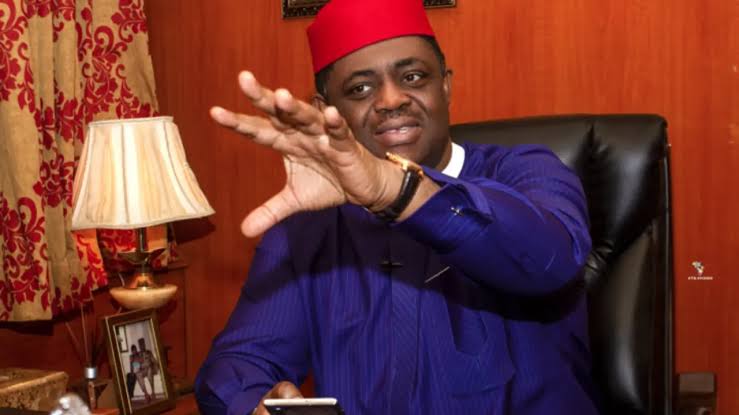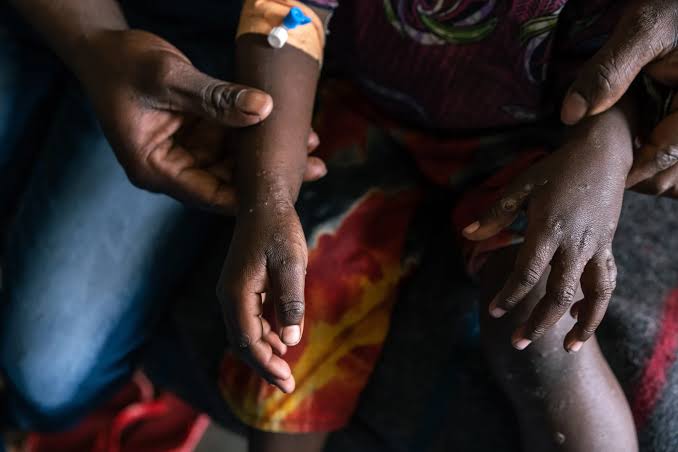Metro
‘Nigeria has witnessed significant progress under Tinubu’— SGF Akume
Published
8 months agoon

Nigeria’s Secretary to the Government of the Federation (SGF), George Akume, has given thumbs up to the administration of President Bola Tinubu, saying the country has witnessed tremendous progress in just one year of the government.
Akume, who was speaking at the ‘Ministerial Sectoral Updates’ in Abuja on Wednesday, said despite the hardships being experienced as a result of the policies of the government, the administration had also rolled out social intervention programmes to mitigate the suffering of the people.
“I make bold to say that, Nigeria, under its present stewardship, has witnessed significant policy strides in various sectors including but not limited to,” Akume said as the Tinubu administration heads to its first year in office.
Listing some of the achievements of the government, the SGF noted in particular the following:
“i. The Presidential accent to the 2023 Electricity Bill, a move that dismantled monopolistic control over electricity generation, transmission and distribution at the national level and granted authority to State Governments, Corporations and individuals to generate, distribute and transmit electricity, thus decentralizing the power sector;
ii. Accent to the passage into law of the Nigeria Data Protection Bill 2023 that established a legal framework for safeguarding personal information and promoting data protection practices in Nigeria; and
iii. The challenging but very necessary Removal of Fuel Subsidy, a longstanding policy notorious for fostering corruption, and inefficiency and imposing significant fiscal strain on the government annually, and primarily benefitting the affluent and smugglers, rather than effectively aiding the general populace.
It is apt to say that under President Tinubu’s stewardship within his first year in office, we have witnessed significant strides in various sectors of our economy.
Through prudent fiscal policies and strategic investments, the Nigerian economy has shown resilience and potential for growth.
The administration’s focus on infrastructure development, job creation and economic diversification has laid the foundation for sustainable progress and prosperity for all Nigerians.
Furthermore, the government’s commitment to good governance and the rule of law has strengthened our democratic institutions and enhanced transparency and accountability in governance,” Akume said.
However, his optimism is not shared by a majority of Nigerians, especially the masses who have been at the receiving end of the stick.
The ordinary Nigerians do not seem to enjoy the present administration of President Tinubu due to the hardship and hunger they have been made to go through due to the policies of the government.
Cost of living has skyrocketed and the prices of basic commodities have gone out of the reach of the masses while government officials are living large at their expense.
A labour leader who lamented the current situation in the country on Wednesday summed it up with these words:
“Government cannot be telling us that there is no money; this is an insult. We did not remove subsidies or float the national currency.
“The government created this problem. Since the removal of the petrol subsidy and floating of the naira, has the government shown proof that the country has no money, no?
“We are aware that the government gave members of the National Assembly no less than N160 million each to buy cars, the same government has released N90 billion to subsidise hajj operations.
‘’The government has renovated the Senate chambers, and the vice president’s office, and it is buying luxury buses for Customs in millions of naira.
‘’They are also buying all manner of SUVs for government officers. Since the removal of subsidies, the government has been making life better for political elites who have been feeding fat on workers.
“Crude oil sales have increased considerably and it has been getting more money in dollars, while workers have been suffering and going deeper into poverty.
“The state governors have been receiving three times more than they were receiving before the removal of subsidy. We cannot accept this. We did not cause the socio-economic challenges the country is facing.
“The government inflicted these problems on the country with their ill-thought out and unprogressive policies of subsidy removal and devaluation of the national currency. If the country has no money, let it reflect in the lives of government officials, their aides and cronies.”
You may like
-


Nigeria: Marketers predict further price cut as another refinery begins operations
-


Nigeria, China extend $2bn currency swap deal
-


‘Don’t start what you can’t finish’, ex-Nigerian official replies President Tchiani
-


Again, Starlink raises prices of its services in Nigeria
-


Niger citizen knocks President Tchiani for neglecting critical issues at home to peddle rumours against Nigeria
-


Dumping England for Nigeria the best decision of my life— Ademola Lookman
Metro
‘Don’t start what you can’t finish’, ex-Nigerian official replies President Tchiani
Published
3 weeks agoon
December 29, 2024
Former Nigerian Aviation Minister, Femi Fani-Kayode, has told President Abdourahamane Tchiani of Niger Republic to refrain from making infantile and puerile allegations that Nigeria is conniving with France and the Lakurawa terrorists to destabilize his country.
Tchiani had, during an interview with Radio-Télévision du Niger on December 25, accused the Nigerian government of using the sect, with the help of foreign security forces notably from France, to wreck havoc in his country, insinuating that President Bola Tinubu had been paid by the France government to allow their military to establish a base in Borno State.
He also alleged that Nigeria, acting in collaboration with the French government and the terrorist group, was responsible for an attack on the Niger-Benin oil pipeline on December 13, 2024, in Gaya, Dosso Region of Niger Republic.
But in a statement he posted on his official X handle on Sunday, Fani-Kayode who is popularly called FFK, said Nigeria does not need the help of France and thr Lakurawa terrorist to destabilize Niger Republic.
FFK insisted that Nigeria is not part of the western powers sponsoring terrorists organizations to wretch havoc on the West African sub region.
“If Nigeria wanted to destabilise Niger Republic, I do not believe that we would need France or any terrorist organisation to do so,” the politician wrote.
He noted that on the contrary, western powers are the ones behind terrorist organizations operating in the region and other parts of Africa.
“I have maintained that the western powers are behind the terrorist groups that have plagued the West African sub region over the last 15 years and for the last ten years I have publicly stated this and given my reasons.
“I am equally certain that Nigeria, being one of the major victims of these terrorist organisations, has had no part in it and that no Nigerian President, past or present, has indulged in such grave and dangerous actions.”
He went on to advice Tchiani against provoking Nigeria with unguarded and infantile utterances capable of stoking Nigeria against his country.
“The Nigerien Military Head of State, Abdourahamane Tchiani, would do well to be careful not to provoke our wrath with his absurd assertions and remain mindful of the fact that the defence budget for his country, Mali and Burkina Faso COMBINED is not up to 25% of Nigeria’s.
“Tchiani’s grave allegations that President Tinubu and NSA Nuhu Ribadu have been bought by the French to destabilise Niger Republic, that our Government is jointly sponsoring a terrorist group with France to do same and that there are French military bases in Nigeria are infantile, puerile, mendacious and asinine.
“It is a squalid attempt by the Nigerien Head of State to sow the seeds of dissention in our country, to alienate our people from constituted authority, to divide our people and to undermine the Tinubu administration,” he added.
“It is also highly provocative and the FG should consider the possibility of taking other more extreeme measures if this reckless provocation continues.
“We are under no obligation to show restraint when we are being undermined and maligned.
Metro
Zambia announces second case of Mpox as country battles cholera outbreak
Published
3 weeks agoon
December 28, 2024
The Zambian Ministry of Health has reported a second case of Monkeypox, popularly known as Mpox, in Kitwe region of Copperbelt Province.
Acting Health Minister, Douglas Syakalima, who made the announcement on Friday during a press conference in Lusaka, revealed that the Ministry is intensifying contact tracing and surveillance to curb further spread of the disease.
Syakalima who also addressed the ongoing cholera outbreak in Nakonde, Muchinga Province, said thus far, seven cases have been confirmed.
“The second Mpox case involves a 34-year-old female from Ndeke, Kitwe, who presented with symptoms including rash, fever, swollen lymph nodes, and oral ulcers on December 21,” Syakalima said at the press parley.
He noted that there was an initial misdiagnosis with chickenpox in Lumwana, North-Western Province, but laboratory tests on December 26 confirmed that it was Mpox.
Syakalima added that the patient’s husband, who works in a neighboring country with confirmed Mpox cases, had experienced similar symptoms earlier this month.
“Both patients are now stable and under close monitoring. A rapid response team has been deployed to trace contacts and prevent further spread,” he said, adding that eight close contacts of the couple are currently under observation, while nationwide surveillance has been heightened.
The Health Minister added that on December 26, five cholera cases were confirmed at Nakonde Urban Clinic with the first three patients, a husband, wife, and their son, admitted on December 24 with symptoms of diarrhea, vomiting, dehydration, and shock.
“Today, two more cases have been reported, bringing the total to seven confirmed cholera cases from the same household,” Syakalima stated.
He explained that Nakonde’s location as a border town with high cross-border movement poses a risk for the disease to spread to other parts of the country.
The Minister however, assured that the Ministry has deployed teams to trace contacts, chlorinate water sources, disinfect affected homes, and activate Incident Management Systems at district and provincial levels while surveillance has been heightened, and contact tracing is ongoing for 33 individuals.
“The government remains committed to preventing further spread of these diseases,” Syakalima assured.
EDITOR’S PICK


Nigeria: Marketers predict further price cut as another refinery begins operations
Oil marketers and the Nigerian Midstream and Downstream Petroleum Regulatory Authority expect refined petroleum product prices to reduce as another...


Kenya: Consumer inflation rises to 3.0% from 2.8%
Kenya’s statistics agency said on Tuesday that Kenya’s consumer price inflation increased slightly to 3.0% year-over-year in December from 2.8%...


South Africa’s Transnet’s half-year deficit hits $117m
Transnet, a state-owned logistics company in South Africa, announced on Tuesday that it had lost 2.2 billion rand ($117.48 million)...


Nigeria, China extend $2bn currency swap deal
A 15 billion yuan ($2 billion) currency-swap arrangement between China and Nigeria has been extended to boost investment and commerce...


Egypt’s central bank maintains overnight rates
As anticipated, Egypt’s central bank has maintained its overnight interest rates, stating that although inflation was predicted to drop significantly...


Illicit flows cost Nigeria, others $1.6bn daily— AfDB
According to the African Development Bank (AfDB), illicit money flows and profit shifting by multinational corporations doing business in Africa...


‘Don’t start what you can’t finish’, ex-Nigerian official replies President Tchiani
Former Nigerian Aviation Minister, Femi Fani-Kayode, has told President Abdourahamane Tchiani of Niger Republic to refrain from making infantile and...


Again, Starlink raises prices of its services in Nigeria
Elon Musk’s satellite internet service provider, Starlink, has again jacked up the prices of its services in Nigeria after an...


Former President of Moroccan club Raja sentenced to 3 years in prison
The former President of Moroccan top club, Raja Casablanca, Mohamed Aouzal, has been sentenced to three and a half years...


Zambia announces second case of Mpox as country battles cholera outbreak
The Zambian Ministry of Health has reported a second case of Monkeypox, popularly known as Mpox, in Kitwe region of...


